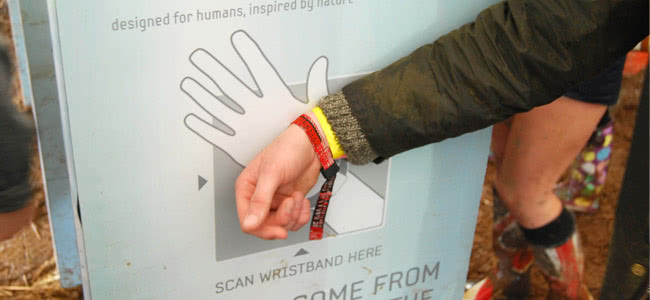Following its recent launch in Australia, including new updates and plans to tackle market leader Spotify, music streaming service Deezer has announced their involvement with an innovative new approach to technology being used at music festivals.
A press release issued by Deezer announced they’re “powering a quantum leap” in Radio Frequency Identification (RFID) technology at live music events, with a new application that uses the wristband technology to provide a personalised account of a user’s music festival activities in a new program called ‘Where Was I Last Night?’
Firstly, what is RFID? Basically, they’re fitted wristbands that contain an electronically fitted microchip, similar to the technology used in London’s Oyster card and Melbourne’s own Myki public transport systems, that are becoming all the vogue at music festivals across Europe.
Festival-goers ‘swipe’ in and out of areas at the site by scanning their wristbands at turnstiles and handheld devices, enabling not only for the organisers to monitor the data, but are designed to cut down on ticket scalping and speeding up the inevitable queues; or as Intellitix, the company who put together the RFID tech put it, they provide “secure access control, social media integration, and cashless payment systems.”
Deezer’s new Where Was I Last Night? program is piggybacking off the information gathered by the RFID wristband to provide additional content and information to the festival-goer, and was launched at the Netherlands’ recent music festival Eurosonic Nooderslag – featuring a huge lineup of nearly 300 acts.“This service is a quantum leap for the festival experience… RFID has never been used this way at a festival before.” – Johan Van Roy, Deezer
According to the Deezer press release, while the Intellitix developed service “is being used as an A&R tool at Eurosonic Noorderslag, the application allows festival fans to create a truly personal record of their experience.” Which means that while it was being used for statistic gathering purposes (age brackets for advertisers, quantifiable attendance records etc.), Deezer is using that same data to provide custom post-festival playlists and information.
“This service is a quantum leap for the festival experience,” says Johan Van Roy, Managing Director of Deezer Benelux. “RFID has never been used this way at a festival before. By identifying which performances the visitor has attended, he or she can be sent an email the following morning with personalised content related to those artists. It’s a completely anonymous and private system for each attendee, who can now continue to enjoy the event long after it has finished.”
A hypothetical for the average punter could discover a map of where they wandered from stage to stage throughout the day, a playlist from Eurosonic Norderslag acts like Scottish alt-rockers Frightened Rabbit, buzz duet Aluna George and ‘that cool French chick’ they couldn’t remember the name of, who would be revealed to be Melody’s Echo Chamber, and even include a mix of similar recommended artists.
Ruud Berends, Eurosonic Noorderslag’s International Marketing and PR Manager added the festival’s enthusiam at helping launch Where Was I Last Night? “at the outset of the 2013 season,” adding that “the implications for the wider festival industry this summer are clear.”“By identifying which performances the visitor has attended, he or she can be sent an email the following morning with personalised content related to those artists.”
Deezer’s RFID technology also has interesting applications if it was rolled out at live music venues, imagine catching a gig to a show and having the setlist, photos, videos, and support acts all appearing in a customised email in your inbox the next morning? It’s still early days and purely hypothetical – but that’s the kind of enhanced exposure Deezer is aiming for with its new service.
As for the security implications, a free-speaking representative of Intellitix – the company that developed the RFID wristbands – took to the comments section of what he deems a particularly paranoid article to clarify some issues to those worried that “rather than build a businesss, promoters or music brands are actually going to go behind your back, break the law and sell your details to criminals.”
The Intellitix speaker notes that RFID wearers cannot be tracked, as they “are passive and have a read range of approximately two inches (four centimetres),” meaning their location remains anonymous, or as he humorously puts it “cider drinkers can still get happily drunk and wake up in a hedge with no one being any the wiser…”
Doubly, data sharing from the device is considered optional, “no data about a patron is shared with a third party without their express permission or knowledge. Should a patron choose to share their data with a band or sponsor, it would entirely up to them. The heart of the festival experience remains unaffected by RFID unless a patron wants to benefit from some of the many benefits that it offers.”
The Deezer enabled app is the latest in a series of technology innovations looking to shape the future of the live music experience, most notably, last December Ticketek introduced a smartphone app that included a ‘friend spotter’ feature, using “state-of-the-art augmented reality technology” that will allow Facebook friends locate each other instantly in a crowd using their iPhone camera viewfinder.
The future of live music, exciting or creepy? It remains to be seen.

































